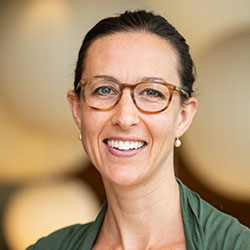Whitney Elizabeth Harrington, MD, PhD

Specialties
- Children's Title: Physician, Division of Infectious Diseases, Seattle Children's Hospital, Seattle, Washington
- Academic Title: Associate Professor, Pediatric Infectious Diseases
- On Staff Since: July 2018
"Every day I am inspired by my patients and their families. I strive to provide thoughtful and personalized care to support them in their journeys both locally and globally."
-
Biography
Whitney E. Harrington, MD PhD. Physician, Division of Infectious Diseases, Seattle Children's Hospital; Member, Center for Global Infectious Diseases Research, Seattle Children's Research Institute; Assistant Professor of Pediatrics, University of Washington School of Medicine. Dr. Harrington's research focuses on immunology and infection at the maternal-fetal interface.
Dr. Harrington completed her Pediatric Residency and Pediatric Infectious Diseases Fellowship at Seattle Children's Hospital / University of Washington. She enjoys seeing pediatric infectious disease patients in the inpatient and outpatient settings at Seattle Children's Hospital.
Dr. Harrington's research is focused on maternal-fetal immunology and infection during pregnancy and infancy. In particular, she investigates the role of maternal microchimerism (maternal cells acquired by the fetus during pregnancy) in fetal and infant immunity to malaria, HIV, and early vaccination. She is a member of the Pediatric Infectious Diseases Society, the Infectious Diseases Society of America, and the American Society of Tropical Medicine and Hygiene.Board Certification(s)
Pediatric Infectious Diseases
Pediatrics
Education
University Of Washington Medical Center, Seattle, WA
Residency
University of Washington School of Medicine, Seattle, WA
Fellowship
University of Washington School of Medicine, Seattle, WA
Research Description
Dr. Harrington's research focuses on intergenerational immune interactions and their effect on susceptibility to infection during pregnancy and infection. In particular, her lab investigates the role of maternal microchimerism (maternal cells acquired by the fetus in utero) in fetal and infant immune development, early vaccine responses, and susceptibility to infection. She has previously demonstrated that malaria infection and inflammation of the placenta results in infants acquiring more maternal cells. In addition, she found that infants with detectable maternal cells were more susceptible to malaria infection but, interestingly, less likely to be sick from their infections. Current projects in her lab include isolating and phenotyping the maternal cells, determining whether infants acquire a maternal graft with immunologic memory, and whether the maternal cells affect the development of immune responses against malaria and HIV. She collaborates with Drs. Frenkel and Jaspan, Drs. Pepper and Gammill (UW), and Dr. Nelson (Fred Hutchinson Cancer Center).
-
Related Resources
-
The Harrington Lab focuses on intergenerational immune interactions and their effect on susceptibility to infection during pregnancy and infection.
-
-
Patient Testimonials
-
Awards and Honors
Loading...Award Name Award Description Awarded By Award Date {{ award.name }} {{ award.description }} {{ award.organization }} {{ award.displayDate }} No Awards and Honors found for Whitney Elizabeth Harrington, MD, PhD
-
Publications
Loading...No Publications found for Whitney Elizabeth Harrington, MD, PhD
-
Presentations
Loading...Presentation Title Event Location Date {{ presentation.title }} {{ presentation.presentedAt }} {{ presentation.location }} {{ presentation.displayDate }} No Presentations found for Whitney Elizabeth Harrington, MD, PhD
-
Research Funding
Loading...Grant Title Grantor Amount Award Date {{ funding.title }} {{ funding.grantedBy }} {{ funding.amount }} {{ funding.displayDate }} No Research Funding found for Whitney Elizabeth Harrington, MD, PhD
-
Clinical Trials and Research Studies
Loading...{{ item.st }}
No clinical trials found for Whitney Elizabeth Harrington, MD, PhD.
